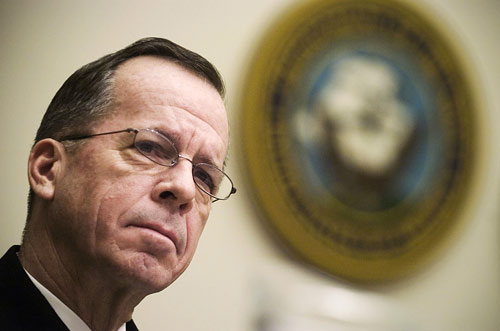
The US does not want to see confrontation with Iran but is still preparing its military for that possibility, America's top uniformed officer said Thursday.
"We've looked to do all we can to ensure that conflict doesn't break out there, while at the same time preparing forces, as we do for many contingencies that we understand might occur," Adm. Mike Mullen, chairman of the Joint Chiefs of Staff, said during an appearance at the Washington Institute for Near East Policy.
Mullen had been asked whether the US military was stretched too thin to take further action in trouble spots beyond Iraq and Afghanistan.
"We're very hard-pressed right now" because of the two wars, he noted, but added that it is primarily ground troops that have been deployed, and "the likelihood that our ground forces would have to go somewhere in these kinds of numbers in some other part of the world, or even in the same region, I think is pretty low."
Many experts assess that any American military engagement with Iran would most likely rely on air and naval power.
Mullen was even more definitive when asked to assess whether Teheran was seeking to acquire nuclear weapons.
"I believe that they're on a path that has a strategic intent to develop nuclear weapons and have been for some time," he said.
Mullen's words were echoed by a report in The New York Times this week that US President Barack Obama's top advisers say "they no longer believe the much disputed National Intelligence Estimate" from 2007, which assessed that Iranian scientists ended all work on designing a nuclear warhead in 2003.
Israel had long objected to that finding, and questioned the intelligence evaluation behind it. Mullen's comments and those of other US officials bring the two countries more in line.
"I think the Obama administration now fully acknowledges that Iran intends to conduct a nuclear weapons capability program," Israeli Ambassador Michael Oren told The Jerusalem Post Wednesday. "We agree with the administration on the intent of the Iranian regime to acquire nuclear military capability."
The Times also reported that technical challenges and potential Western sabotage have significantly hurt Iran's production of low enriched uranium, a necessary component for a nuclear bomb. That has set back the American estimated timeline for production of a weapon, according to the Times.
Oren indicated that Israel remains focused on the low enriched uranium still being produced.
"In spite of some reported breakdown in centrifuges, Iran still has something in the vicinity of 4,000 centrifuges that are operating and they are churning out significant quantities of LEU," he said.
Mullen called any attainment of a nuclear weapon by Iran "incredibly destabilizing," particularly because it could set off an arms race in the region and because of Teheran's support for terrorism.
"On the other hand," he added, "striking Iran, that also has a very, very destabilizing outcome. What I worry about in most of the cases are the unintended consequences."
He said that to prevent such scenarios, the US needed "to continue to aggressively address the nuclear weapons issue," to stress international discussions of additional sanctions and to continue "where possible to engage and have a dialogue."
Jim Hoagland, who has written extensively about foreign policy for The Washington Postand participated in Thursday's event, described Mullen's remarks on Iran as vague.
"That does reflect a lack of a clear policy within the administration about what to do on Iran," he said.

No comments :
Post a Comment